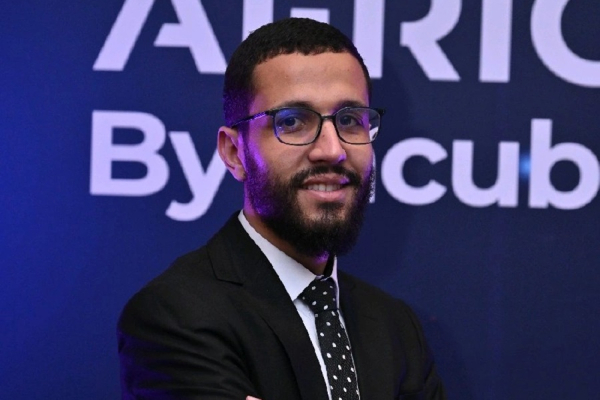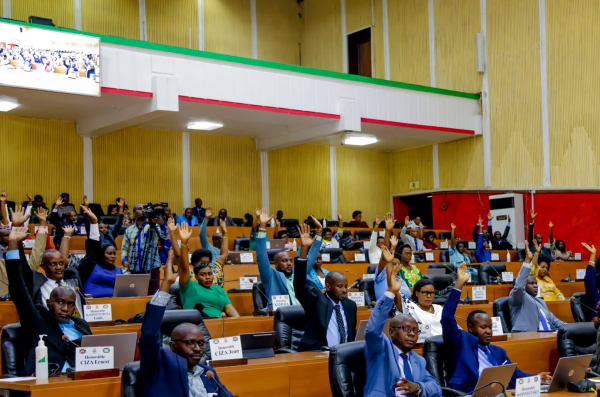-
Algerian engineer Aymen Hamidi founded Kabas to deploy field-oriented artificial intelligence in heavy industry.
-
Kabas develops two core products, DALILE and Virtual Lab, to turn industrial data into operational decisions.
-
The company targets industrial efficiency gains while keeping full control over data and infrastructure.
Aymen Hamidi, a mining engineer by training and an Algerian entrepreneur, founded and leads Kabas, a technology company that integrates artificial intelligence to transform and optimise industrial processes.
Founded in 2023, Kabas positions itself as a deep-tech company that places AI at the service of heavy industries while ensuring full control over data and infrastructure. The company bases its offering on a pragmatic vision of artificial intelligence built around two complementary products: DALILE and Virtual Lab.
DALILE operates as an intelligent assistant dedicated to industrial knowledge. The system explores and exploits large volumes of technical documents and complex datasets, and it deliberately distances itself from consumer chatbots. The solution relies on a set of specialised agents that share analytical tasks, cross-check information, and deliver structured answers from simple queries written in everyday language.
Virtual Lab complements this approach by addressing another critical industrial challenge: the transition from idea to experimentation. The platform simulates scenarios before laboratory tests or pilot-scale trials by adjusting formulations, process parameters, or operating conditions. Teams can compare options, measure the impact of decisions, and identify the best balance between performance and cost without immobilising equipment or consuming raw materials. Connected to DALILE, Virtual Lab uses knowledge extracted from company data to further refine analysed scenarios.
On the academic and professional front, Aymen Hamidi earned a mining engineering degree in 2023 from the National Polytechnic School of Algeria. He completed several internships in the mining sector, including at ENOF Spa and SOMIPHOS, where he worked on extraction sites and phosphate processing plants. In 2022, he joined Sonatrach as a geophysics engineering intern, before completing a two-month laboratory engineering placement in 2023 at Drilling Fluids Services aux Puits (DFSP).
This article was initially published in French by Melchior Koba
Adapted in English by Ange Jason Quenum
-
Burundi lawmakers unanimously approved a law regulating the collection, processing, and use of personal data amid accelerating digitalisation.
-
The legislation creates an independent data protection authority and introduces criminal penalties for violations.
-
The reform aligns Burundi with African and international digital governance standards and supports rollout of a biometric national ID.
Burundi adopted a dedicated legal framework for personal data protection as lawmakers moved to secure the country’s digital transformation and strengthen citizen trust.
Members of the National Assembly meeting in plenary session on Thursday, January 15, in Kigobe unanimously adopted a bill governing the collection, processing, and exploitation of personal data, as public administration and services expand digital systems.
Données personnelles : le Burundi verrouille l’ère numérique
— Irebe FM (@IrebeFM) January 15, 2026
Une Assemblée en mode responsabilité
L’Assemblée nationale s’est réunie ce 15 janvier 2026, au Palais des Congrès de Kigobe, sous la présidence de Daniel Gélase Ndabirabe, afin d’analyser et d’adopter le projet de loi… pic.twitter.com/NRu0IhKEsK
The Ministry of Interior, Community Development, and Public Security sponsored the law to close a legal gap created by the rapid spread of digital tools across government, the private sector, and daily life. Authorities expanded computerized systems, digitised the voter register, and advanced the rollout of a biometric national identity card, which together increased the production of sensitive data that existing Burundian law regulated weakly.
The law establishes core principles for privacy protection and emphasizes respect for fundamental rights and freedoms. It introduces multiple data protection regimes and creates an independent administrative authority responsible for enforcement, which aligns Burundi’s framework with international standards for digital governance.
On the operational front, the legislation introduces specific criminal penalties for violations, complementing existing cybercrime provisions. Lawmakers framed these measures as essential to restoring public confidence in digital systems, as parliamentary debates highlighted concerns over data security and misuse.
Beyond the national context, the reform fits within a broader continental push. The African Union has promoted legal harmonisation through the Malabo Convention on cybersecurity and personal data protection. About 39 African countries have already adopted dedicated data protection laws, while several others continue legislative reviews.
In Burundi, the new framework should also remove a key obstacle to deploying the biometric national identity card. Authorities said technical milestones already include installing registration software aligned with the new administrative boundaries. Officials currently test the system in about a dozen pilot communes before a phased nationwide rollout.
This article was initially published in French by Samira Njoya
Adapted in English by Ange Jason Quenum
Ghana-based Stars From All Nations (SFAN) has secured a grant from the British Council Ghana to train 100 creative entrepreneurs. Through its ReadyforWork platform, SFAN will offer training in business and digital skills to help young talent build sustainable companies. Applications for the program are open through Friday, January 30.
Nigerian fintech Paycrest announced a $404,000 funding round on Tuesday to build out its decentralized settlement layer. By linking stablecoins with fiat in emerging markets, Paycrest is making cross-border payments faster and more compliant. Having already undergone real-world testing, the platform offers a resilient payment infrastructure designed specifically to navigate local constraints.
Egypt’s MoneyHash has teamed up with Spare to bring Pay-by-Bank options to UAE merchants. By reducing costs and accelerating settlements, the collaboration promises a more seamless checkout experience. The move is a key step in MoneyHash’s mission to scale open banking and modernize the Middle East’s payment landscape.
-
Nigeria ranked 144th out of 193 countries in the UN e-government index in 2024 and seeks to accelerate digital reform.
-
Denmark’s cBrain partnered with Nigeria’s Publica AI to deploy the F2 government software platform across federal ministries and agencies.
-
Nigeria aims to digitize 75% of public services by 2027, positioning the country as a key market for digital government in Africa.
Ranked 144th out of 193 countries by the United Nations for e-government in 2024, Nigeria is seeking to modernize its public services. To achieve this goal, the country has expanded international partnerships, while Denmark’s cBrain could play a central role in this transformation.
cBrain, a Danish provider of government software, announced on Wednesday, January 14, a partnership with Nigerian technology solutions provider Publica AI to deploy its F2 platform across Nigeria’s federal ministries and agencies. The standardized solution combines case management, automated workflows, and embedded artificial intelligence, offering a ready-to-use tool designed to accelerate administrative modernization.
Under the agreement, Publica AI will handle implementation and adaptation to Nigeria’s regulatory requirements. “This partnership combines international expertise with local knowledge, ensuring that all sovereign data remains in Nigeria while delivering world-class technology,” said Willie Ignatius, Chief Executive Officer of Publica AI.
cBrain designed its off-the-shelf F2 digital platform specifically for government use. The platform provides core capabilities required for digital government and reduces reliance on custom development and lengthy IT projects. These capabilities include case management, integrated workflows, self-service tools, registries for citizens and businesses, mass-operation functions to manage large case volumes, and on-site embedded artificial intelligence.
The deployment of F2 forms part of cBrain’s broader Africa strategy, which the company has already tested in Kenya. Nigeria’s selection reflects its strategic importance, as the country has more than 200 million people and rising demand for accessible digital public services. The Nigerian government aims to digitize 75% of its public services by 2027.
Beyond administrative efficiency, the partnership seeks to stimulate Nigeria’s digital economy by improving access to public services and strengthening institutional transparency and accountability. The deal also represents a strategic opportunity for cBrain, which plans to expand its African footprint while leveraging international standards to build a model that it can replicate in other countries across the continent.
This article was initially published in French by Samira Njoya
Adapted in English by Ange Jason Quenum
- Amazon secured a seven-year landing permit to launch Project Kuiper satellite internet services in Nigeria from February 2026.
- The approval opens Nigeria’s LEO satellite broadband market to direct competition with Starlink, which counts more than 66,000 subscribers.
- Amazon plans Ka-band services with speeds of up to 400 Mbps, targeting households, businesses, and critical infrastructure.
Nigeria has opened its satellite broadband market to a new global player. Amazon secured a seven-year landing permit from the Nigerian Communications Commission, allowing Project Kuiper to launch internet services in the country from February 2026. The decision supports Nigeria’s strategy to diversify connectivity infrastructure and attract next-generation technology investment.
“The approval aligns with global best practices and reflects Nigeria’s commitment to opening its satellite communications market to next-generation broadband service providers,” the NCC said, highlighting the strategic importance of the authorization amid rising demand for connectivity.
The license allows Amazon Kuiper to operate its space segment in Nigeria as part of a global low-Earth-orbit constellation of up to 3,236 satellites. The authorization covers fixed satellite services, mobile satellite services, and earth stations in motion. These services target households, businesses, mobility use cases, logistics, aviation, maritime transport, and critical infrastructure.
Amazon’s entry ends Starlink’s quasi-exclusive dominance of Nigeria’s LEO satellite internet market. Starlink benefited from a first-mover advantage and built an estimated base of more than 66,000 subscribers. Kuiper’s arrival introduces direct competition between two global players with large financial, technological, and industrial resources. That rivalry could reshape pricing, service quality, and coverage.
From a technical standpoint, the authorization covers operations in the Ka frequency band, which supports high data transmission capacity. Amazon plans to use 100-MHz channels and deliver speeds of up to 400 Mbps while keeping terminal costs compatible with mass adoption. These features strengthen satellite broadband as a credible alternative to terrestrial networks, including in urban and semi-urban areas.
Nigeria represents a strategic market for Amazon. The country still faces major connectivity gaps despite its large population. According to the NCC, more than 23 million Nigerians live in unserved or underserved areas, while mobile broadband penetration reached 50.58% in November 2025. In that context, LEO satellites, which offer low latency, support advanced digital uses ranging from cloud computing to digital financial services.
Beyond households, Kuiper’s services could meet demand from businesses in oil and gas, mining, ports, and logistics corridors, where fiber deployment remains costly or technically complex. Amazon, which renamed Project Kuiper as Amazon LEO in November 2025, plans to leverage integration with Amazon Web Services to bundle connectivity with cloud services.
With this authorization, Nigeria strengthens its position as one of Africa’s most dynamic satellite broadband markets. Increased competition among LEO operators should gradually improve internet speed, affordability, and resilience, benefiting consumers, businesses, and Nigeria’s digital economy.
Samira Njoya, Ecofin Agency
- Zoubeir Jlassi won the first Google AI Film Award at the 1 Billion Followers Summit in Dubai.
- The short film Lily used generative AI across characters, animation, narration, and post-production.
- The Google-backed award carries a $1 million prize and drew nearly 3,500 entries from over 100 countries.
Born and trained in Tunisia, Zoubeir Jlassi works as an artistic director, motion designer, and filmmaker. He recently gained international recognition with his short film Lily, which earned him the first Google AI Film Award at the 1 Billion Followers Summit, held in Dubai from Friday January 9 to Sunday January 11.
Running approximately nine minutes, Lily follows the story of an archivist haunted by a doll linked to an accident for which he bears responsibility. Jlassi created the film entirely through a combination of advanced generative artificial intelligence tools. These tools supported character and environment creation, AI-assisted animation and motion synthesis, machine-learning-based visual storytelling, and AI-optimized post-production workflows.
Through this technological framework, the short film examined the ability of generative models to convey complex emotions such as guilt and redemption while maintaining visual coherence aligned with studio cinema standards. Lily won the Google AI Film Award after competing against nearly 3,500 films from more than 100 countries. Google Gemini backed the prize, which carries an award value of $1 million.
Jlassi currently serves as artistic director at Carthage+ TV, a private Tunisian general-interest television channel targeting Arabic-speaking audiences. He graduated from the Higher School of Design Sciences and Technologies, where he earned a national degree in arts and design professions in 2009.
This article was initially published in French by Melchior Koba
Adapted in English by Ange Jason Quenum
- Stub offers SMEs an integrated platform to manage invoicing, finances, and administrative tasks without complex spreadsheets.
- The platform automates invoicing, bank synchronization, expense categorization, and financial reporting.
- Founder Tayla Dandridge brings fintech and design experience from Absa Group and Finastra.
Tayla Dandridge is a South African entrepreneur based in London, England. She co-founded and leads Stub as chief executive officer. The online platform helps entrepreneurs manage finances and administrative tasks simply, without relying on complex spreadsheets.
Founded in 2023, Stub allows users to create quotes, invoices, credit notes, and customer statements within a few clicks. The platform enables users to convert quotes into invoices, or reverse the process, depending on sales progress. Users can also schedule recurring invoices, bill in multiple currencies, and embed payment links to allow customers to pay online.
Stub extends beyond invoicing. The platform centralizes all documents for each client, including quotes, invoices, credit notes, and statements. This structure simplifies monitoring and follow-ups. At the same time, entrepreneurs access an overview of sales, expenses, profit, and cash flow through ready-to-use reports designed for daily management, tax compliance, and funding applications.
Stub also connects to bank accounts to automatically retrieve transactions. The system then categorizes transactions, leaving users to validate them. Several user testimonials highlight bank synchronization and automatic categorization as features that transform previously unclear finances into clear and actionable data, while saving significant time.
In addition, the platform integrates inventory tracking features to identify out-of-stock items and high-turnover products. Stub also includes asset management tools, with automatic depreciation calculations. The platform relies on a complete accounting framework that generates all required financial statements, while remaining accessible to non-specialists who seek a clear view of their business activity.
Dandridge graduated from Stellenbosch University, where she earned a bachelor’s degree in marketing in 2015. She also holds a postgraduate diploma in marketing and advertising, which she obtained in 2016 from the Red & Yellow Creative School of Business.
After completing a marketing internship at Vitality UK in 2016, Dandridge joined Absa Group in South Africa. She successively held roles as a design intern, service designer, and design project lead. Between 2021 and 2022, she worked as a senior consultant at Finastra, a financial solutions company.
This article was initially published in French by Melchior Koba
Adapted in English by Ange Jason Quenum
- Morocco plans to generate 100 billion dirhams ($11 billion) in additional GDP from artificial intelligence by 2030.
- The government expects AI adoption to create 50,000 jobs and train 200,000 graduates in AI-related skills.
- Morocco will launch the Jazari Root AI network, including a 50-MW sovereign data center, to anchor its national ecosystem.
Morocco has placed artificial intelligence at the center of its economic transformation strategy. By 2030, the kingdom aims to generate 100 billion dirhams in additional GDP, equivalent to about $11 billion, through structured AI deployment. Official projections also link this strategy to the creation of 50,000 jobs and the training of 200,000 graduates in AI-related skills.
Amal El Fallah Seghrouchni, Minister Delegate for Digital Transition and Administrative Reform, unveiled these targets on Monday, January 12, in Rabat during a digital-focused conference. She stated that Morocco’s current GDP stands at around $170 billion and described artificial intelligence as a major growth lever, provided authorities integrate it within a structured, sovereign, and impact-driven framework.
These announcements form part of Morocco’s forthcoming national artificial intelligence strategy, whose roadmap authorities plan to release shortly. The strategy rests on several pillars, including skills development, the build-out of sovereign digital infrastructure, and the expansion of cloud and data-processing services capable of supporting advanced AI use cases nationwide.
To operationalize this ambition and structure the national ecosystem, Morocco also announced the launch of the Jazari Root network, which will serve as a central hub for the country’s artificial intelligence ecosystem. The project will include a 20-hectare campus and a 50-MW sovereign data center. Jazari Root aims to bring together researchers, startups, large companies, and public institutions around applied projects ranging from e-government and smart cities to agriculture, healthcare, and logistics.
By structuring investments and its ecosystem at an early stage, Morocco seeks to position itself as a credible artificial intelligence player at regional and African levels. The kingdom aims to capture part of the value that AI could generate in the global economy, which PwC estimates at nearly $15.7 trillion by 2030.
This article was initially published in French by Samira Njoya
Adapted in English by Ange Jason Quenum
More...
The UK-Kenya Tech Hub and Viktoria Ventures have launched Startup 360 Connect to boost early-stage investment in Kenya. In partnership with Anza Village and POV, the "Angel Leads" program will provide hands-on training in deal sourcing, syndication, and due diligence. The goal is to cultivate a new generation of local investors capable of providing sustainable support to innovative startups. Applications are open through Friday, January 30.
Egyptian startup Oasys Health has raised $4.6 million to enhance its AI-powered mental healthcare platform. The company plans to use the funds to automate clinical tasks, integrate data from wearable devices, and offer personalized patient monitoring. This investment will also support its expansion across partner clinics and universities.
The 2026 Africa Tech Summit Nairobi will feature 12 promising startups: Bekia, Bosso Africa Inc, Chefaa, Hizo, Innobid, Niteon, Pretium, Timart, TIBU Health, Vepay, Winich Farms, and Zerobionic. Spanning sectors from healthcare and finance to sustainability and robotics, these ventures represent the next generation of African innovation, offering high potential for both investment and impact.
- Adjemin connects Abidjan-based merchants to online buyers through a local e-commerce platform.
- The startup added logistics, food delivery, and mobile money payments to expand its ecosystem.
- AdjeminPay integrates major mobile money services such as Orange Money.
Nathanael Yao is an Ivorian IT specialist and entrepreneur. He co-founded and leads Adjemin, an e-commerce startup focused on buying and selling products across multiple categories.
Founded in 2019, Adjemin developed an online platform under the same name. The platform allows merchants based in Abidjan and its municipalities to offer a wide range of everyday products directly through the website. The company focuses on connecting local sellers with buyers seeking competitive prices.
For merchants, the platform provides a digital storefront that enables product and price visibility to a broader audience without requiring large physical retail spaces. For consumers, the platform offers simple navigation, diverse product categories, price comparison in CFA francs, and identification of products available nearby in Abidjan.
To strengthen its commercial ecosystem, Adjemin developed several complementary services. The startup launched Smart Livraison, a delivery management system designed for e-commerce operators. It also introduced Chez Nous, a service that delivers meals to users at workplaces and university campuses.
Adjemin also developed AdjeminPay, a payment solution designed to meet merchant needs in the African market. The service targets businesses and online platforms that seek to collect payments for goods and services through websites or mobile applications. AdjeminPay supports digital payments through leading mobile money services, including Orange Money, and integrates directly into merchants’ platforms.
On the academic side, Nathanael Yao graduated from ITA Ingénierie SA. He earned a professional bachelor’s degree in computer science in 2016, followed by a first-year master’s degree in 2017. He also holds expertise in search engine marketing.
This article was initially published in French by Melchior Koba
Adapted in English by Ange Jason Quenum















